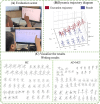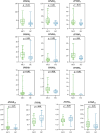A new method for community-based intelligent screening of early Alzheimer's disease populations based on digital biomarkers of the writing process
- PMID: 40534727
- PMCID: PMC12174119
- DOI: 10.3389/fncom.2025.1564932
A new method for community-based intelligent screening of early Alzheimer's disease populations based on digital biomarkers of the writing process
Abstract
Background: In response to the shortcomings of the current Alzheimer's disease (AD) early populations assessment, which is based on neuropsychological scales with high subjectivity, low accuracy of repeated measurements, tedious process and dependence on physicians, it was found that digital biomarkers based on the writing process can effectively characterize the cognitive deficits of patients with mild cognitive impairment (MCI) due to AD.
Methods: This study designed a digital writing assessment paradigm, extracted dynamic handwriting and image data during the paradigm assessment process, and analyzed digital biomarkers of the writing process to assess subjects' cognitive functions. A total of 72 subjects, including 34 health controls (HC) and 38 MCI due to AD, were enrolled in this study.
Results: Their combined screening efficacy of digital biomarkers based on the MCI writing process due to AD populations having an area under curve (AUC) of 0.918, and a confidence interval (CI) of 0.854-0.982, was higher than the Montreal Cognitive Assessment Scale (AUC = 0.859, CI = 0.772-0.947) and the Mini-mental State Examination Scale (AUC = 0.783, CI = 0.678-0.888).
Conclusion: Therefore, digital biomarkers based on the writing process can characterize and quantify the cognitive function of MCI due to AD populations at a fine-grained level, which is expected to be a new method for intelligent screening and early warning of early AD populations in a community-based physician-free setting.
Keywords: Alzheimer’s disease; digital biomarkers; early warning; mild cognitive impairment; writing.
Copyright © 2025 Li, Li, Liu, Huang, Wang, Tu, Wang, Zhang, Luo, Zhang and Chen.
Conflict of interest statement
The authors declare that the research was conducted in the absence of any commercial or financial relationships that could be construed as a potential conflict of interest.
Figures








References
-
- Albert M. S., DeKosky S. T., Dickson D., Dubois B., Feldman H. H., Fox N. C., et al. (2011). The diagnosis of mild cognitive impairment due to Alzheimer's disease: recommendations from the National Institute on Aging-Alzheimer's Association workgroups on diagnostic guidelines for Alzheimer's disease. Alzheimers Dement. 7, 270–279. doi: 10.1016/j.jalz.2011.03.008, PMID: - DOI - PMC - PubMed
-
- Burnham S. C., Coloma P. M., Li Q. X., Collins S., Savage G., Laws S., et al. (2019). Application of the NIA-AA research framework: towards a biological definition of Alzheimer's disease using cerebrospinal fluid biomarkers in the AIBL study. J. Prev Alzheimers Dis. 6, 248–255. doi: 10.14283/jpad.2019.25, PMID: - DOI - PubMed
-
- Chen S., Cao Z., Nandi A., Counts N., Jiao L., Prettner K., et al. (2024). The global macroeconomic burden of Alzheimer's disease and other dementias: estimates and projections for 152 countries or territories. Lancet Glob. Health 12, e1534–e1543. doi: 10.1016/s2214-109x(24)00264-x, PMID: - DOI - PubMed
LinkOut - more resources
Full Text Sources

